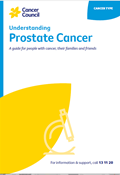- Home
- Prostate cancer
- Diagnosis
- Tests
- Prostate specific antigen blood test
Prostate specific antigen blood test
Prostate specific antigen (PSA) is a protein made by both normal prostate cells and cancerous prostate cells. PSA is found in the blood and can be measured with a blood test. The test results will show the level of PSA in your blood as nanograms of PSA per millilitre (ng/mL) of blood.
There is not one normal PSA level for everyone. If your PSA level is above 3 ng/mL (called the threshold), this may be a sign of prostate cancer. Younger people or people with a family history of prostate cancer may have a lower threshold. PSA levels can vary from day to day. If your PSA is higher than expected, your GP will usually repeat the test to help work out your risk of prostate cancer.
Your PSA level can be raised even when you don’t have cancer. Other common causes of raised PSA levels include benign prostate hyperplasia, recent sexual activity, an infection in the prostate, or a recent digital rectal examination. Some people with prostate cancer have normal PSA levels for their age range.
Free PSA or free-to-total test
Your doctor may also suggest that you have a free PSA test. This test measures the ratio of free PSA to total PSA in your blood. Free PSA is PSA that is not attached to other blood proteins. This test may be suggested if your PSA level is between 4–10 ng/mL and your doctor is not sure whether you need a biopsy. A low free-to-total PSA ratio may be a sign of prostate cancer.
→ READ MORE: Digital rectal examination
Podcast: Tests and Cancer
Listen to more of our podcast for people affected by cancer
More resources
A/Prof Ian Vela, Urologic Oncologist, Princess Alexandra Hospital, Queensland University of Technology, and Urocology, QLD; A/Prof Arun Azad, Medical Oncologist, Urological Cancers, Peter MacCallum Cancer Centre, VIC; A/Prof Nicholas Brook, Consultant Urological Surgeon, Royal Adelaide Hospital and A/Prof Surgery, The University of Adelaide, SA; Peter Greaves, Consumer; Graham Henry, Consumer; Clin Prof Nat Lenzo, Nuclear Physician and Specialist in Internal Medicine, Group Clinical Director, GenesisCare Theranostics, and Notre Dame University Australia, WA; Henry McGregor, Men’s Health Physiotherapist, Adelaide Men’s Health Physio, SA; Jessica Medd, Senior Clinical Psychologist, Department of Urology, Concord Repatriation General Hospital, NSW; Dr Tom Shakespeare, Director, Radiation Oncology, Coffs Harbour, Port Macquarie and Lismore Public Hospitals, NSW; A/Prof David Smith, Senior Research Fellow, Daffodil Centre, Cancer Council NSW; Allison Turner, Prostate Cancer Specialist Nurse (PCFA), Canberra Region Cancer Centre, Canberra Hospital, ACT; Maria Veale, 13 11 20 Consultant, Cancer Council QLD; Michael Walkden, Consumer; Prof Scott Williams, Radiation Oncology Lead, Urology Tumour Stream, Peter MacCallum Cancer Centre, and Professor of Oncology, Sir Peter MacCallum Department of Oncology, The University of Melbourne, VIC.
View the Cancer Council NSW editorial policy.
View all publications or call 13 11 20 for free printed copies.



